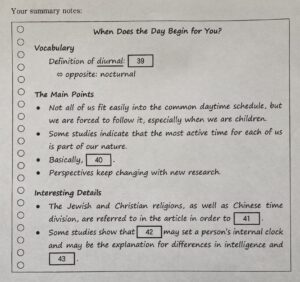今回は、第5問 を終えて
第6問 A に入ります。
基本的な問題の扱い方
今回、このブログでは、
共通テスト(英語)の「リーディング」の問題だけを扱うこととします。
基本的な問題の扱い方は、下記の通りにします。
①問題の提示
※基本的には「大問」毎に扱う予定ですが、問題の量などによりそれより細かく区切って取り扱うこともあります。
②模範解答の提示
③解説
④そのほかの補説
第6問A:配点12点 ▶︎各3点(4問)
それでは、第6問 A の問題を見ていきましょう。
A Your study group is learning about “how time of day affects people.” You
have found an article you want to share. Complete the summary notes for
your next meeting.
|
When Does the Day Begin for You? ー When asked “Are you a morning person?” some reply “No, I’m a night ー Yet another proverb states: “Early to bed, early to rise makes a man ー What makes one person a lark and another an owl? One theory suggests ー Does everyone follow the system of beginning days in the morning? The ー Research indicates owls are smarter and more creative. So, perhaps larks ー Can people change? While the results are not all in, studies of young |

問1 Choose the best option for【 39 】.
① achieve goals quickly
② likes keeping pet birds
③ lively in the daytime
④ skillful in finding food
問2 Choose the best option for【 40 】.
① a more flexible time and performance schedule will be developed in the
future
② enjoying social activities in the morning becomes more important as we
age
③ it might be hard for us to change what time of day we perform best
④ living on the owl schedule will eventually lead to social and financial
benefits
問3 Choose the best option for【 41 】.
① explain that certain societies have long believed that a day begins at night
② indicate that nocturnal people were more religious in the past
③ say that people have long thought they miss chances due to morning
laziness
④ support the idea that owls must go to work or school on the lark
schedule
問4 Choose the two best options for【 42 】and【 43 】
① amount of sleep
② appearance
③ behavior
④ cultural background
⑤ religious beliefs
⑥ time of birth
![]()
👉模範解答と解説は次のページです。



コメント